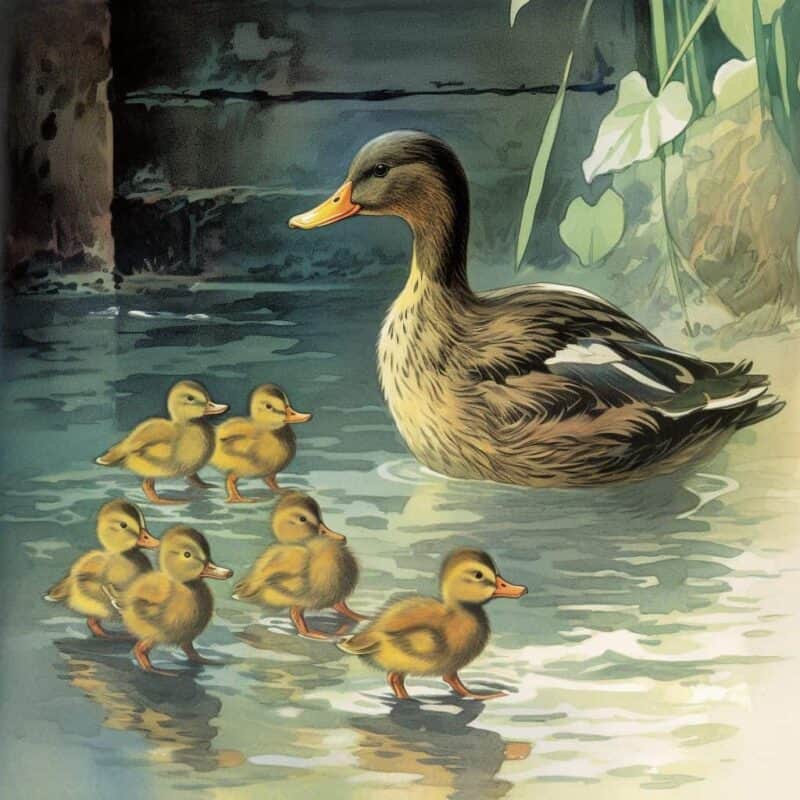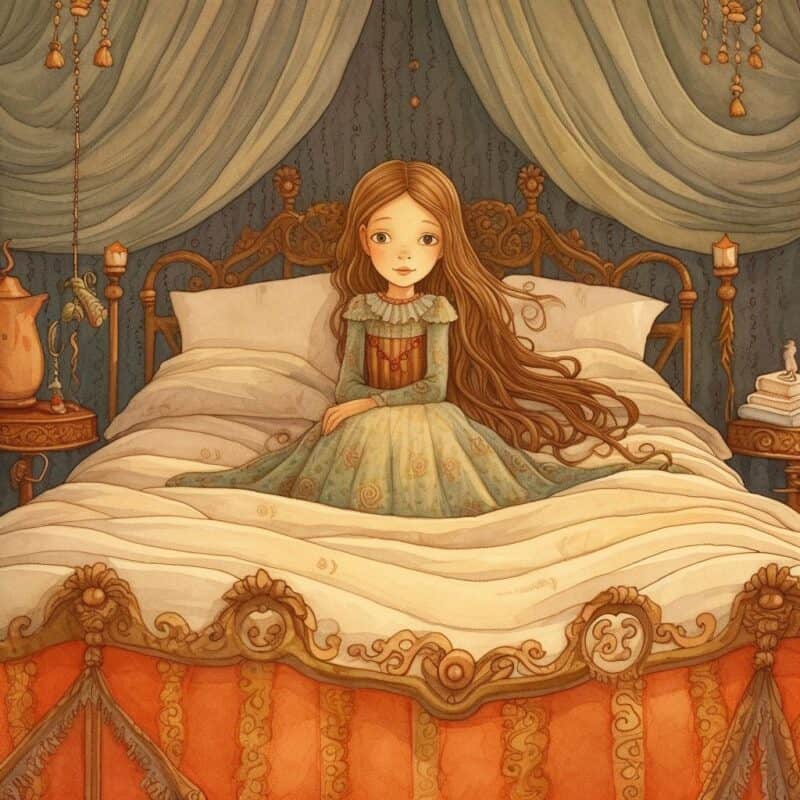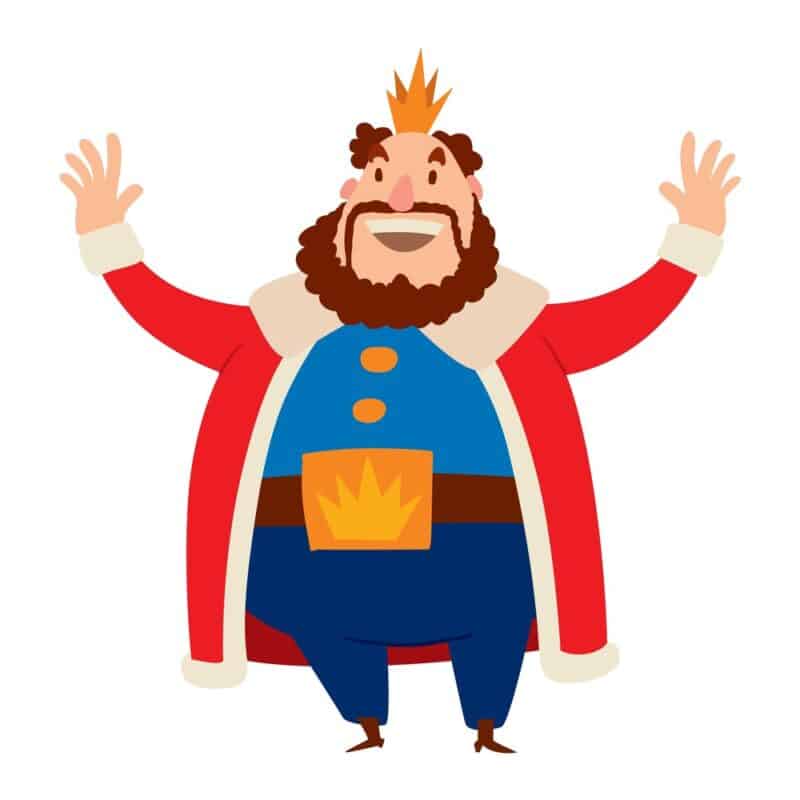Once upon a time, there was a king who had three daughters. One day, he decided to find out which of them loved him the most. He called them to him and asked each one: “How much do you love me?”
Continue reading →Fairy tales of the Brothers Grimm
Clever Hannah
Once upon a time, there was a cook named Hannah. Hannah was cheerful, always in a good mood, and had a special fondness for her beautiful shoes with red roses. Every morning, she would lovingly put them on, stroll through the garden, and admire her reflection in the mirror that hung in the hallway of the house where she worked. In the evenings, when she returned to the kitchen, she enjoyed pouring herself a glass of wine, which always awakened her appetite.
Continue reading →The Ugly Duckling
One day in early spring, a mama duck was impatiently walking around the eggs in her nest, waiting for all her ducklings to hatch. Suddenly, she heard the first “crunch”. One of the yellow ducklings was coming into the world. And soon, she heard the cluck a second and a third time. Only the fourth, the biggest of the eggs, still nothing. The mama duck circled around it, pecking at it with her beak to urge it on, but the duckling in the egg had yet to hatch.
Continue reading →The Princess and the Pea
Once upon a time, in a kingdom far far away, there lived a handsome prince who wanted to marry a real princess. If only he knew a way to tell which princesses were real.
Continue reading →The Emperor’s New Suit
Many years ago, there lived an emperor who cared too much about his looks. He liked to wear the most fancy suits and parade around his kingdom. He had a new coat for evry hour of the day and often liked to show off his outfits.
Continue reading →The twelve apostles
Three hundred years before the birth of the Lord Christ, there lived a mother who had twelve sons, but was so poor and needy that she no longer knew how she was to keep them alive at all. She prayed to God daily that he would grant that all her sons might be on the earth with the Redeemer who was promised.
Continue reading →The true bride
There was once on a time a girl who was young and beautiful, but she had lost her mother when she was quite a child, and her step-mother did all she could to make the girl’s life wretched. Whenever this woman gave her anything to do, she worked at it indefatigably, and did everything that lay in her power. Still she could not touch the heart of the wicked woman by that; she was never satisfied; it was never enough. The harder the girl worked, the more work was put upon her, and all that the woman thought of was how to weigh her down with still heavier burdens, and make her life still more miserable.
One day she said to her, “Here are twelve pounds of feathers which thou must pick, and if they are not done this evening, thou mayst expect a good beating. Dost thou imagine thou art to idle away the whole day?” The poor girl sat down to the work, but tears ran down her cheeks as she did so, for she saw plainly enough that it was quite impossible to finish the work in one day. Whenever she had a little heap of feathers lying before her, and she sighed or smote her hands together in her anguish, they flew away, and she had to pick them out again, and begin her work anew. Then she put her elbows on the table, laid her face in her two hands, and cried, “Is there no one, then, on God’s earth to have pity on me?” Then she heard a low voice which said, “Be comforted, my child, I have come to help thee.” The maiden looked up, and an old woman was by her side. She took the girl kindly by the hand, and said, “Only tell me what is troubling thee.” As she spoke so kindly, the girl told her of her miserable life, and how one burden after another was laid upon her, and she never could get to the end of the work which was given to her. “If I have not done these feathers by this evening, my step-mother will beat me; she has threatened she will, and I know she keeps her word.” Her tears began to flow again, but the good old woman said, “Do not be afraid, my child; rest a while, and in the meantime I will look to thy work.” The girl lay down on her bed, and soon fell asleep. The old woman seated herself at the table with the feathers, and how they did fly off the quills, which she scarcely touched with her withered hands! The twelve pounds were soon finished, and when the girl awoke, great snow-white heaps were lying, piled up, and everything in the room was neatly cleared away, but the old woman had vanished. The maiden thanked God, and sat still till evening came, when the step-mother came in and marvelled to see the work completed. “Just look, you awkward creature,” said she, “what can be done when people are industrious; and why couldst thou not set about something else? There thou sittest with thy hands crossed.” When she went out she said, “The creature is worth more than her salt. I must give her some work that is still harder.”
Sharing joy and sorrow
There was once a tailor, who was a quarrelsome fellow, and his wife, who was good, industrious, and pious, never could please him. Whatever she did, he was not satisfied, but grumbled and scolded, and knocked her about and beat her. As the authorities at last heard of it, they had him summoned, and put in prison in order to make him better. He was kept for a while on bread and water, and then set free again. He was forced, however, to promise not to beat his wife any more, but to live with her in peace, and share joy and sorrow with her, as married people ought to do. All went on well for a time, but then he fell into his old ways, and was surly and quarrelsome. And because he dared not beat her, he would seize her by the hair and tear it out. The woman escaped from him, and sprang out into the yard, but he ran after her with his yard-measure and scissors, and chased her about, and threw the yard-measure and scissors at her, and whatever else came his way. When he hit her he laughed, and when he missed her, he stormed and swore. This went on so long that the neighbors came to the wife’s assistance. The tailor was again summoned before the magistrates, and reminded of his promise. “Dear gentlemen,” said he, “I have kept my word, I have not beaten her, but have shared joy and sorrow with her.” – “How can that be,” said the judge, “when she continually brings such heavy complaints against you?” – “I have not beaten her, but just because she looked so strange I wanted to comb her hair with my hand; she, however, got away from me, and left me quite spitefully. Then I hurried after her, and in order to bring her back to her duty, I threw at her as a well-meant admonition whatever came readily to hand. I have shared joy and sorrow with her also, for whenever I hit her I was full of joy, and she of sorrow, and if I missed her, then she was joyful, and I sorry.” The judges were not satisfied with this answer, but gave him the reward he deserved.
Continue reading →The stolen farthings
A father was one day sitting at dinner with his wife and his children, and a good friend who had come on a visit was with them. And as they thus sat, and it was striking twelve o’clock, the stranger saw the door open, and a very pale child dressed in snow-white clothes came in. It did not look around, and it did not speak; but went straight into the next room. Soon afterwards it came back, and went out at the door again in the same quiet manner. On the second and on the third day, it came also exactly in the same way. At last the stranger asked the father to whom the beautiful child that went into the next room every day at noon belonged? “I have never seen it,” said he, neither did he know to whom it could belong. The next day when it again came, the stranger pointed it out to the father, who however did not see it, and the mother and the children also all saw nothing. On this the stranger got up, went to the room door, opened it a little, and peeped in. Then he saw the child sitting on the ground, and digging and seeking about industriously amongst the crevices between the boards of the floor, but when it saw the stranger, it disappeared. He now told what he had seen and described the child exactly, and the mother recognized it, and said, “Ah, it is my dear child who died a month ago.” They took up the boards and found two farthings which the child had once received from its mother that it might give them to a poor man; it, however, had thought, “Thou canst buy thyself a biscuit for that,” and had kept the farthings, and hidden them in the openings between the boards; and therefore it had had no rest in its grave, and had come every day at noon to seek for these farthings. The parents gave the money at once to a poor man, and after that the child was never seen again.
Continue reading →The maid of Brakel
A girl from Brakel once went to St. Anne’s Chapel at the foot of the Hinnenberg, and as she wanted to have a husband, and thought there was no one else in the chapel, she sang,
Continue reading →


